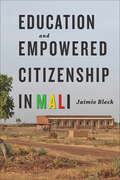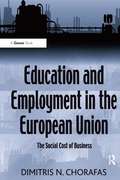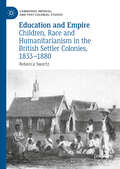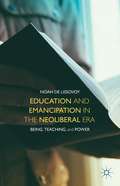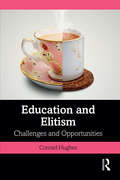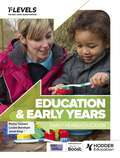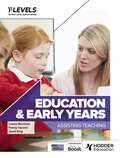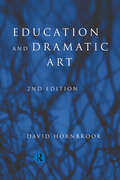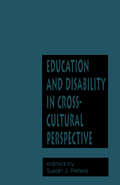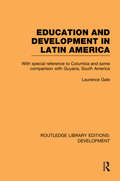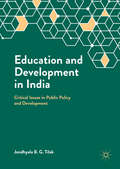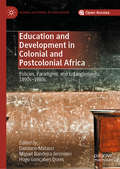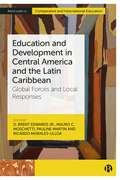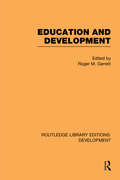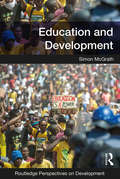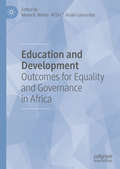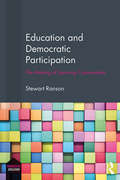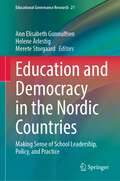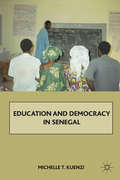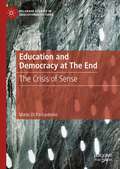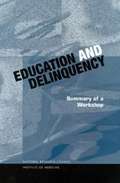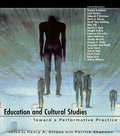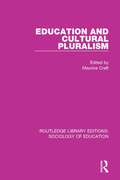- Table View
- List View
Education and Empowered Citizenship in Mali
by Jaimie BleckExplores the connections between access to education and political engagement in Mali.Primary school enrollment has nearly tripled in Mali since 1991, when the country made its first transition to multiparty democracy. Jaimie Bleck explores the effect of this expanded access to education by analyzing the relationship between parents’ and students’ respective experiences with schooling and their current participation in politics. In a nation characterized both by the declining quality of public education and by a growing number of accredited private providers, does education contribute substantially to the political knowledge and participation of its citizens? Are all educational institutions (public and private, Islamic and secular) equally capable of shaping democratic citizens?Education and Empowered Citizenship in Mali is informed by Bleck’s original survey of one thousand citizens, which she conducted in Mali before the 2012 coup d’état, along with exit polls and interviews with parents, students, and educators. Her results demonstrate conclusively that education of any type plays an important role in empowering citizens as democratic agents. Simply put, students know more about politics than peers who have not attended school. Education also appears to bolster participation of parents. Bleck finds that parents who send their children to public school are more likely to engage in electoral politics than other Malian citizens. Furthermore, Bleck demonstrates that increasing levels of education are associated with increases in more engaged forms of political participation, including campaigning, willingness to run for office, and contacting government officials.
Education and Employment in the European Union: The Social Cost of Business
by Dimitris N. ChorafasEducation, employment policy, and pensions are inextricably linked and critical to any sort of business or economic revival, let alone success, and all three are addressed in Education and Employment in the European Union. In the first part of this meticulously researched and highly informative book, Dimitris Chorafas argues that European educational standards, from primary schools through to universities, leave much to be desired. The author then turns to employment. Already affected by problems with education, employment is fettered by structural issues, ranging from inflexible labour laws to heavy social costs. Here, the author suggests what might be done to get employment moving again in difficult economic times. Employment and pensions work in synergy. In the final part, Chorafas examines the implications of and future for pension provision, taking a polyvalent approach which embraces state pensions, company pensions and the workings of pension funds - as well as healthcare issues and the longevity risk. The evidenced analysis of the three interlinked policy areas in this book identifies the issues and the relationships between them. The findings and suggestions will be important to business practitioners, business educators, government authorities, policy makers, consultancies and others either within or wishing to learn lessons from the European Union.
Education and Empire: Children, Race, and Humanitarianism in the British Settler Colonies, 1833-1880 (Cambridge Imperial and Post-Colonial Studies Ser.)
by Rebecca SwartzThis book tracks the changes in government involvement in Indigneous children’s education over the nineteenth century, drawing on case studies from the Caribbean, Australia and South Africa. Schools were pivotal in the production and reproduction of racial difference in the colonies of settlement. Between 1833 and 1880, there were remarkable changes in thinking about education in Britain and the Empire with it increasingly seen as a government responsibility. At the same time, children’s needs came to be seen as different to those of their parents, and childhood was approached as a time to make interventions into Indigenous people’s lives. This period also saw shifts in thinking about race. Members of the public, researchers, missionaries and governments discussed the function of education, considering whether it could be used to further humanitarian or settler colonial aims. Underlying these questions were anxieties regarding the status of Indigenous people in newly colonised territories: the successful education of their children could show their potential for equality.
Education and Emancipation in the Neoliberal Era
by Noah De LissovoyThis book describes how neoliberalism as societal philosophy works to limit human potential in our school systems. Analyzing contemporary school reform and control, punishment, and pathologization in schools, this book outlines a theory of emancipation and a process by which pedagogy can build solidarity in classrooms and society more broadly.
Education and Elitism: Challenges and Opportunities
by Conrad HughesEducation and Elitism discusses polemical debates around privilege, private schools, elitist universities, equal access to education and underlying notions of fairness. The overarching question that runs through the book is about the future of education worldwide: how can schools and universities tread the tightrope between access and quality? This book investigates the philosophical positions that characterize elitism and anti-elitism to establish three types: meritocratic, plutocratic and cultural. These types of elitism (and their counter-positions) are used as reference points throughout the book's analysis of successive educational themes. The conclusion leads to suggestions that bridge the worlds of elitism and egalitarianism worldwide. The book covers critical questions related to the sociology and philosophy of education with particular focus on contemporary disruptors to education such as the COVID-19 pandemic and protest movements for social justice. With an attempt to offer readers an objective overview, this book will be an excellent compendium for students, academics, and researchers of the sociology of education, education policy and comparative education. It will also be of interest toschool leaders, university provosts and professionals working in curriculum design.
Education and Early Years T Level: Early Years Educator
by Penny Tassoni Louise Burnham Janet KingBegin your path to a career in Education and Early Years with this T Level textbook that covers both the core content and the early years educator specialism content you will need to understand to be successful in your qualification. For first teaching from September 2023.Develop your understanding of the key principles, concepts, theories and skills that will give you a solid foundation of knowledge to support you during your industry placement.Created in partnership with NCFE and written by highly respected authors Penny Tassoni, Louise Burnham and Janet King, you can feel confident relying on the insights and experience of these experts.- Track and consolidate your learning using the learning outcomes at the beginning of every unit and Test Yourself questions throughout each unit- Ensure you don't miss any important terminology with key terms highlighted and defined in context- Contextualise your learning with case studies, reflection tasks and practice points- Prepare for your examinations with knowledge-based practice questions- Understand how to approach your assignments with practical tasks and model answers
Education and Early Years T Level: Early Years Educator
by Penny Tassoni Louise Burnham Janet KingBegin your path to a career in Education and Early Years with this T Level textbook that covers both the core content and the early years educator specialism content you will need to understand to be successful in your qualification. For first teaching from September 2023.Develop your understanding of the key principles, concepts, theories and skills that will give you a solid foundation of knowledge to support you during your industry placement.Created in partnership with NCFE and written by highly respected authors Penny Tassoni, Louise Burnham and Janet King, you can feel confident relying on the insights and experience of these experts.- Track and consolidate your learning using the learning outcomes at the beginning of every unit and Test Yourself questions throughout each unit- Ensure you don't miss any important terminology with key terms highlighted and defined in context- Contextualise your learning with case studies, reflection tasks and practice points- Prepare for your examinations with knowledge-based practice questions- Understand how to approach your assignments with practical tasks and model answers
Education and Early Years T Level: Assisting Teaching
by Penny Tassoni Louise Burnham Janet KingBegin your path to a career in Education and Early Years with this T Level textbook that covers both the core content and the assisting teaching specialism content you will need to understand to be successful in your qualification. For first teaching from September 2023.Develop your understanding of the key principles, concepts, theories and skills that will give you a solid foundation of knowledge to support you during your industry placement.Created in partnership with NCFE and written by highly respected authors Penny Tassoni, Louise Burnham and Janet King, you can feel confident relying on the insights and experience of these experts.- Track and consolidate your learning using the learning outcomes at the beginning of every unit and Test Yourself questions throughout each unit- Ensure you don't miss any important terminology with key terms highlighted and defined in context- Contextualise your learning with case studies, reflection tasks and practice points- Prepare for your examinations with knowledge-based practice questions- Understand how to approach your assignments with practical tasks and model answers
Education and Early Years T Level: Assisting Teaching
by Penny Tassoni Louise Burnham Janet KingBegin your path to a career in Education and Early Years with this T Level textbook that covers both the core content and the assisting teaching specialism content you will need to understand to be successful in your qualification. For first teaching from September 2023.Develop your understanding of the key principles, concepts, theories and skills that will give you a solid foundation of knowledge to support you during your industry placement.Created in partnership with NCFE and written by highly respected authors Penny Tassoni, Louise Burnham and Janet King, you can feel confident relying on the insights and experience of these experts.- Track and consolidate your learning using the learning outcomes at the beginning of every unit and Test Yourself questions throughout each unit- Ensure you don't miss any important terminology with key terms highlighted and defined in context- Contextualise your learning with case studies, reflection tasks and practice points- Prepare for your examinations with knowledge-based practice questions- Understand how to approach your assignments with practical tasks and model answers
Education and Dramatic Art
by David HornbrookTo this day, Education and Dramatic Art remains the only fully worked critique of drama education in schools. Provocative and iconoclastic, this new edition brings the argument up-to-date and locates the author's proposals for a curriculum based on the making, performing and appraisal of dramas securely in the evolving culture of schools. The first section of the book traces the origins and fortunes of drama in schools in the context of changing political times and argues that by neglecting the customs and practices of the theatre, drama-in-education has often kept from the students it professes to empower, the very knowledge and understanding necessary for them to take command of their subject. Part two examines the developmental and pedagogic claims of drama-in-education. Theories of knowledge and meaning and assumptions about schools drama's power to establish a moral and social agenda, are all called to account. Finally, Education and Dramatic Art proposes a multiculturally-based, theoretical structure for the teaching of drama which pulls the theatre and the classroom together and offers teachers the foundation for a broad and balanced drama curriculum with its own distinctive body of knowledge and skills.
Education and Disability in Cross-Cultural Perspective (Reference Books in International Education)
by Susan J. PetersFirst Published in 1993. Routledge is an imprint of Taylor & Francis, an informa company.
Education and development in Latin America (Routledge Library Editions: Development)
by Laurence GaleFirst published in 1969, this volume presents a survey of the contemporary national education system in Latin American countries. Laurence Gale describes the uneven provision of schools for different sections of the community and the problems which arise with the racial, cultural and geographical difficulties. He examines the main features in education throughout Latin America, areas of co-operation and agreement and differences of policy and provision.
Education and Development in India: Critical Issues In Public Policy And Development
by Jandhyala B.G. TilakDrawing on empirical, interdisciplinary research, this book presents a critical review of some of the major issues that are of interest to researchers, policymakers and planners in developing as well as advanced countries, including specifically in India. It provides an in-depth review of some of the major development policy issues in education in general, and in India in particular, over the past 2-3 decades. Besides presenting an overview of the educational developments in India that reflects issues such as growth, equity, efficiency, foreign aid, decentralization, center-state relations, financing, and cost recovery, the book puts forward in-depth analyses of education poverty, interrelations between education and poverty, low level of outcomes in elementary education, effects of structural adjustment policies and approaches on education, south-south cooperation, etc. It also critically discusses changes in policies relating to financing higher education, external assistance for education, and how the growth of private higher education is affecting society at large. The dichotomy between public policy and action is also highlighted in many chapters. On the whole, while the importance of education is being increasingly recognized, the state does not seem to be as willing to foot the bill for education as the households and even the private sector. Occasionally contrasting with international evidence on, for example, financing higher education, private higher education, or the effects of neo-liberal policies, the book offers an interesting read for a wider audience.
Education and Development in Colonial and Postcolonial Africa: Policies, Paradigms, and Entanglements, 1890s–1980s (Global Histories of Education)
by Miguel Bandeira Jerónimo Damiano Matasci Hugo Gonçalves DoresThis open access edited volume offers an analysis of the entangled histories of education and development in twentieth-century Africa. It deals with the plurality of actors that competed and collaborated to formulate educational and developmental paradigms and projects: debating their utility and purpose, pondering their necessity and risk, and evaluating their intended and unintended consequences in colonial and postcolonial moments. Since the late nineteenth century, the “educability” of the native was the subject of several debates and experiments: numerous voices, arguments, and agendas emerged, involving multiple institutions and experts, governmental and non-governmental, religious and laic, operating from the corridors of international organizations to the towns and rural villages of Africa. This plurality of expressions of political, social, cultural, and economic imagination of education and development is at the core of this collective work.
Education and Development in Central America and the Latin Caribbean: Global Forces and Local Responses
by D. Brent Edwards Jr., Mauro C. Moschetti, Pauline Martin, and Ricardo Morales-UlloaRooted in an international political economy theoretical framework, this book provides unique insights into the global forces and local responses that are shaping education systems in Central America and the Latin Caribbean (CALC). The book covers all Spanish-speaking countries of the CALC region and examines the effects of macro-economic pressures, geopolitical intervention, neo-colonial relationships, global pandemics, transnational gang networks, and the influence of international organizations. Chapters analyse the challenges and opportunities these global forces present to education systems in the region as well as highlighting the local efforts to address, mitigate, and counteract them. In doing so, the book illuminates how education can contribute to either maintaining or challenging inequalities and exclusion in the face of pressures from the global to local levels.
Education and Development (Routledge Library Editions: Development)
by Roger M. GarrettFirst published in 1984, this collection represents the combined contributions to an international conference held at the University of Bristol in April 1983. In assessing the complex relationship between education and development, it covers a wide range of countries in its appraisal and presents pictures both of optimism and pessimism. All, however, encourage the reader to re-examine long-held beliefs, and presents a new starting point for fresh discussion of this vital subject.
Education and Development: Education, Training And Development In Africa (Routledge Perspectives on Development)
by Simon McGrathThis title explores the place of education in development debates and provides a systematic as well as a theoretical overview of the main approaches to education and development. It emphasises the fact that education is profoundly shaped by national and local cultures even if many issues are shared across institutions in different locations. Education and Development discusses different theoretical accounts from different disciplinary traditions to help students understand the complexity of the overall debate. The text does not shy away from discussions of education’s negative impacts, and insists that an account of education must include consideration of early childhood development, adult, vocational and higher education, as well as the growing range of informal and distance forms. It includes chapters on human capital, human rights and human development, and on education, gender and development, and draws on examples from a wide range of countries and regions such as India, Hong Kong, Kenya and South Africa. The book has a well-developed pedagogy including text boxes, chapter summaries, key questions, links to websites and videos, and annotated further reading sections. Particular attention is paid to ensuring that a plurality of voices, contexts and educational sub-sectors are represented in the boxes, weblinks and references. Education and Development provides an introductory overview to the field, aimed at the undergraduate level, while critically engaging with key themes and questions. The book will also be of interest to development practitioners, policymakers, entrepreneurs and corporate employees engaged in aspects of education and development work.
Education and Development: Outcomes for Equality and Governance in Africa
by Muna B. Ndulo N’Dri T. Assié-LumumbaThis edited volume addresses a critical aspect of development in Africa: the intersection between education and governance. Using case studies and experiences from different parts of the continent, this book assesses how the potential for human resources, in terms of education, can be leveraged in the development process to achieve equity, inclusive development and governance outcomes in Africa. This book builds on the "resource curse" to focus on human resources as an alternative paradigm to sustainable development in Africa. At a time when concerns over access to quality education is an important issue among policy makers and international development agents, this timely project calls attention to one of the most critical aspects of development in Africa.
Education and Democratic Participation: The Making of Learning Communities (Progressive Education)
by Stewart RansonEducation and Democratic Participation is an important and timely contribution to the emerging debate surrounding the value of educating citizens and communities in order to empower them to participate in democratic change. Responding to the effects of neo-liberal ideology on comprehensive education and public services, this book examines the purposes and conditions for reimagining an educated democracy. Arguing that social divisions and cultural misrecognition have intensified to the point of crisis, Ranson explains that a just society must create opportunities for diverse, cohesive and tolerant neighbourhoods to flourish. In order to achieve this, education will need to reimagine learners as prospective citizens and as cooperative makers of the democratic communities in which they live and work. Showing that participation in public forums, councils and associations can provide a real means of enabling members of different communities to learn how to respect and value one another, this book provides persuasive arguments that a broader pedagogy of democracy is needed to confront the common dilemmas facing society. This work is aimed at researchers, academics and postgraduates, particularly those lecturing and studying in the areas of education, the social sciences and politics. It will also appeal to professional and practitioner communities in school and college teaching, as well as in local authorities and related public services.
Education and Democracy in the Nordic Countries: Making Sense of School Leadership, Policy, and Practice (Educational Governance Research #21)
by Ann Elisabeth Gunnulfsen Helene Ärlestig Merete StorgaardThis book discusses principals’ prerequisites and work within the five Nordic countries and focuses on schools as formal institutions that carry out functions delegated to them by the social collective. It includes a discussion about what kind of state policy demonstrates autonomy in Nordic schools, as well as the ways in which school leaders as sense makers in local schools possess and enact policy in a globalized economy and a changing world. The book draws both on a range of theoretical frameworks and educational leadership and policy research to provide multiple comparative perspectives of school leadership in the Nordic countries, the moral purpose of schooling, school governance and power relations, expectations towards school leadership, handling of crises, and cultures of trust. The chapters range from in depth-case studies and policy document analyses to large-scale data sets and literature reviews. All chapters have multiple messages for practitioners, policy makers and researchers as they seek to engage with school leadership as a core activity in times of societal changes. As democratic welfare states, the five Nordic countries have many similarities, but also differences which makes it interesting to understand more about various ways to strive towards democracy and well-educated citizens.
Education and Democracy in Senegal
by Michelle T. KuenziThis book examines the role of non-formal education (NFE) in promoting democracy in Senegal.
Education and Democracy at The End: The Crisis of Sense (Palgrave Studies in Educational Futures)
by Mario Di PaolantonioThis book grapples with what it means when education and democracy are at an end: when these two foundational aspects of our society seem to have reached a culminating point, no longer appearing to produce and make sense amid the crises of our time. Engaging topical political events and mobilizing a variety of cultural resources, Di Paolantonio shows that today the possibility of the future and the significance of an expansive transgenerational sensibility are radically in question as trends toward destruction, cruelty, and banality are steering world-defying calamities, and sparking “chronopathologies” of doom and despair among the planet’s occupants. Unfolding his argument through a series of accessible chapters that draw on contemporary philosophy, educational thinking, and cultural-artistic works, Di Paolantonio explores how the transgenerational sensibility retains a possibility we might tap for overcoming the impasses of our time.
EDUCATION AND DELINQUENCY: Summary of a Workshop
by Panel on Juvenile Crime: Prevention Treatment ControlA report on Education and Delinquency
Education and Cultural Studies: Toward a Performative Practice (Critical Studies In Education And Culture Ser.critical Studies In Education)
by Henry A. Giroux Patrick ShannonFirst Published in 1998. Routledge is an imprint of Taylor & Francis, an informa company.
Education and Cultural Pluralism (Routledge Library Editions: Sociology of Education #16)
by Maurice CraftThis collection of essays, first published in 1984, on multicultural education seeks to introduce teachers, teacher educators, educational administrators, policymakers and others to several of the most significant dimensions of the field. But it also brings out the complexity of the issues and the dangers of over-simplification, the inadequacies of much of the available data, and the need for better long-term strategies.
